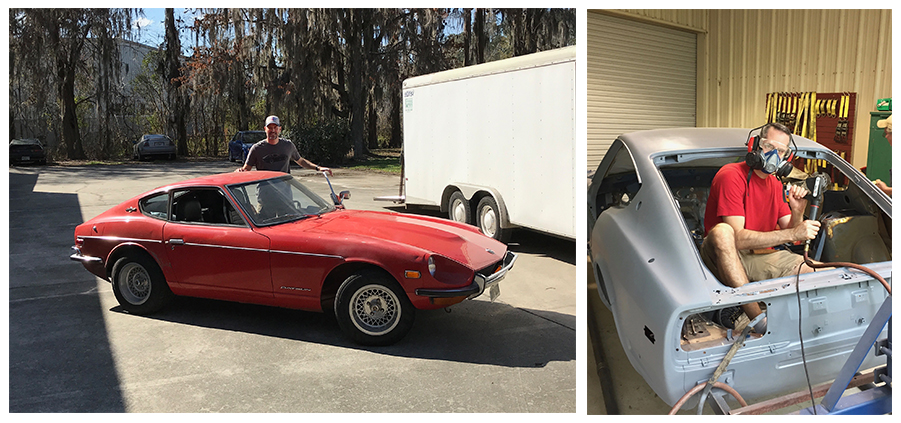Twists of fate
Jeremy Melker, M.D. '99, shares what led him to establish Gainesville ENT and Allergy Associates
 Jeremy Melker, M.D. '99
Jeremy Melker, M.D. '99
March 27, 2018 — It all started on the basketball court.
Local ENT and allergist Jeremy Melker, M.D. ’99, can remember with startling clarity the single incident that convinced him of his future in medicine. It was the spring of 1992 in sweltering Gainesville, Florida. Melker, a college freshman home for break from Amherst College, was playing a pickup game with his younger brother and their neighbors. When his brother slipped and broke his pinky finger, Melker panicked.
“He looked up at me in tears and asked for help. I had never felt so helpless in my life,” he recalls. “My dad, Richard Melker, M.D., Ph.D., an emergency department physician, was out walking our dogs. He came right up to my brother, told him to look the other way and reduced the fracture in two seconds. Right then and there, I decided I never wanted to feel that helpless again. I switched to a pre-medical track.”
After receiving a degree in biology from Amherst College in 1995, Melker pursued a medical degree at the UF College of Medicine. While a medical student, two more incidents occurred that pushed him in the direction of otolaryngology, or the study of the ears, nose and throat. The first involved an innocent attempt to enjoy a tuna fish sandwich on the Sun Terrace.
“The can opener they were using was broken, and it was grinding pieces of metal into the tuna fish. I took a bite of my sandwich, got a piece of the can wedged in the back of my tongue and had to go to the ENT department to have it removed by one of the residents,” he says. “Then, when I was a third-year, the first patient I took care of during my clinical rotations needed a nasopharyngeal biopsy to diagnose a recurrent lymphoma. Transport was backed up, so I took initiative and pushed him in a wheelchair down to the clinic myself. The ENT residents were all friendly and clearly enjoyed what they were doing.”
By his third year of medical school, Melker was confident of the path his career would take. He looked to mentors like Kyle Rarey, M.D., Jay Lynch, M.D., and Josepha Cheong, M.D. ’90, for guidance. His father — professor emeritus of anesthesiology, former director of emergency medicine at UF Health Shands Hospital and the founder of UF Health ShandsCair — served as a constant source of support. Though Melker says he was aware of his father’s impact as a physician, he felt free to create his own roadmap.
“As I went to medical school and residency, it was wonderful to have my dad as a resource. On the other hand, since his career had been at UF, there was a bit more pressure for me to achieve there. I can remember the first time I had to use the Melker cricothyrotomy kit, which my dad invented, while literally surrounded by his colleagues in the trauma room. That was a defining moment when everything was either going to go right, or a moment I would never live down,” he says. “The procedure went smoothly, and the patient survived. I called my dad a few minutes later to tell him that I had done my first Melker cricothyrotomy.”
Years later, the younger Melker has performed many Melker cricothyrotomies as part of the practice he created in 2006, Gainesville ENT and Allergy Associates. Together with partner and fellow UF College of Medicine alumnus Garrett Hauptman, M.D. ’03, Melker tackles the biggest foe of any local nose: allergies.
“I always tell my patients, ‘If you live in North Central Florida, you have to wash North Central Florida out of your nose,’” he says. “With our widely fluctuating weather patterns, the nose has difficulty humidifying and moisturizing air, made worse by very high pollen counts.”
For those suffering from springtime symptoms, Melker recommends regular nasal saline irrigations in addition to allergy medications. For more severe cases, his practice offers desensitization.
“In many cases, the faithful use of irrigations can decrease the need for medications. When medications and environmental control strategies are not enough, we can use SLIT, or sublingual immunotherapy,” he says. “Allergen extracts are administered under the tongue at home, obviating the need to come to a doctor’s office weekly for allergy shots.”
When Melker isn’t working with patients, he spends time with his wife and two sons, aged 15 and 12, and restores and drives vintage Japanese cars. Though Melker says his practice creates a challenging workload, he wouldn’t have it any other way.
“Having only two doctors in a group makes decision-making very easy, particularly when you have two like-minded individuals whose families come first,” he says. “We both work hard, on-call half of our lives, but when we’re not, we can enjoy our families knowing that the other is taking care of everything exactly as we would ourselves.”



